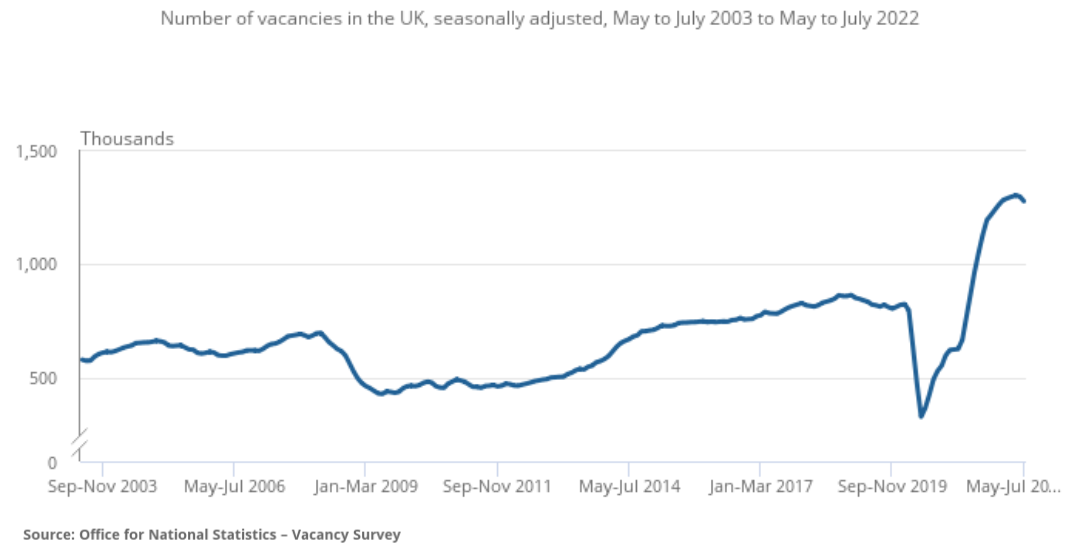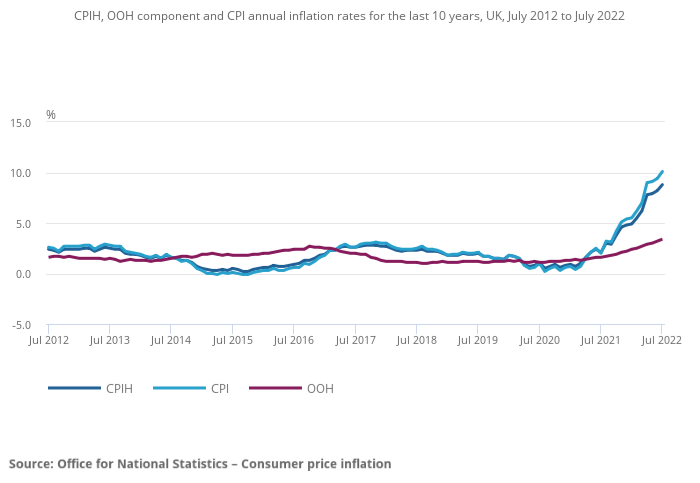
The UK Tech job market is continuing to rebound from the pandemic. Meaning it’s a great time to be looking for your new job in Networking and Infrastructure. But the good times might not last forever. This quarter we’ve seen the amount of open job vacancies in the UK falling for the first quarter since Q2 of 2020, the first potential hints of recession on the horizon.
Jobs in the Network and Infrastructure Industry
The amount of open job vacancies has decreased for the first quarter since early 2020 during the pandemic, and now stands at 1,274,400, with a decrease of 19,800 (1.5%). This decrease in job vacancies came as no surprise, following 11 consecutive months of growth slowdown.
The amount of open jobs has risen rapidly since July 2020, and to significantly higher levels than we saw pre-pandemic. So this slowdown and decline was not a question of if, but a question of when. In the past two years, we have seen IT businesses redouble the recruitment efforts, to compensate for the hiring freezes that were widespread during the pandemic. As supply catches up with demand, and the pool of skilled IT professionals shrinks.
This decline in the job market is likely to continue and be exacerbated by the potential recession we’re facing in the UK. We forecast many businesses slowing down their hiring efforts in preparation for a potential recession. And while the IT Industry is more resistant than others industries, it will still likely feel the effects.

Salaries for IT and Networking Professionals
IT salaries in the UK are continuing to rise at a steady rate since the pandemic. Latest ONS figures show that salaries have risen 4.7% in Q2 for all industries, but an above-average 5% in Information and Technology.
This higher rise of wages for IT professionals is being driven by two factors. A competitive and candidate-driven job market, and an ever-increasing demand for certified and skilled IT professionals. IT businesses (and businesses in all other sectors) are having to offer higher salaries to attract the best talent. Or they risk being outbid by the competition and having their in-demand staff tempted away.
However, due to an increase in the Consumer Price Index (CPI), real world pay fell by an average of 3%. Meaning that despite wages increasing and take home pay going up, it equates to less real world buying power.
 Unfortunately this trend may continue, as inflation and the rising cost-of-living show no signs of slowing, and are forecasted to keep rising at a rapid rate into next year.
Unfortunately this trend may continue, as inflation and the rising cost-of-living show no signs of slowing, and are forecasted to keep rising at a rapid rate into next year.
Despite their increasing demand, this reduction in real term wages has led to instances of strike action by IT professionals in the UK. For example, 40,000 BT workers and Openreach Engineers are currently on strike for the first time in 35 years for the company, in reaction to an offered pay-rise that equates to a real terms pay cut.
Advice For IT Professionals In The Current UK Tech Job Market
BT workers are currently on strike for salaries more aligned with inflation; but it’s not their only option. Because it’s still a great time to be looking for your next job.
The are more open vacancies than skilled IT Professionals to fill them, and due to inflation, salaries being offered are higher out of necessity.
If you’re feeling the pinch with rising bills, have a look at our open jobs to make sure that you’re being compensated at the market for your work. Because with inflation forecasted to increase to 15%, it’s important to make sure you’re being fairly compensated for your work.
Or reach out to us at Dynamic, and get in contact with our team of network and infrastructure recruitment experts, for some confidential careers advice.
IT Professionals with desirable skills and qualifications are still in a position to bargain for higher salaries and increased benefits.
So IT professionals and job seekers can still enjoy this candidate driven job market! But this change in the market means it may soon be IT Managers and decision makers in the driving seat.
